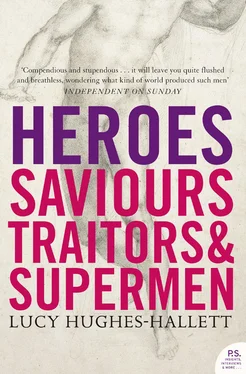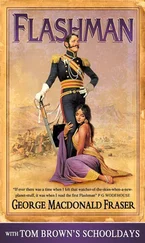Lucy Hughes-Hallett - Heroes - Saviours, Traitors and Supermen
Здесь есть возможность читать онлайн «Lucy Hughes-Hallett - Heroes - Saviours, Traitors and Supermen» — ознакомительный отрывок электронной книги совершенно бесплатно, а после прочтения отрывка купить полную версию. В некоторых случаях можно слушать аудио, скачать через торрент в формате fb2 и присутствует краткое содержание. Жанр: unrecognised, на английском языке. Описание произведения, (предисловие) а так же отзывы посетителей доступны на портале библиотеки ЛибКат.
- Название:Heroes: Saviours, Traitors and Supermen
- Автор:
- Жанр:
- Год:неизвестен
- ISBN:нет данных
- Рейтинг книги:5 / 5. Голосов: 1
-
Избранное:Добавить в избранное
- Отзывы:
-
Ваша оценка:
- 100
- 1
- 2
- 3
- 4
- 5
Heroes: Saviours, Traitors and Supermen: краткое содержание, описание и аннотация
Предлагаем к чтению аннотацию, описание, краткое содержание или предисловие (зависит от того, что написал сам автор книги «Heroes: Saviours, Traitors and Supermen»). Если вы не нашли необходимую информацию о книге — напишите в комментариях, мы постараемся отыскать её.
Heroes: Saviours, Traitors and Supermen — читать онлайн ознакомительный отрывок
Ниже представлен текст книги, разбитый по страницам. Система сохранения места последней прочитанной страницы, позволяет с удобством читать онлайн бесплатно книгу «Heroes: Saviours, Traitors and Supermen», без необходимости каждый раз заново искать на чём Вы остановились. Поставьте закладку, и сможете в любой момент перейти на страницу, на которой закончили чтение.
Интервал:
Закладка:
The resulting host’s might was matched by its splendour. The captains (gentlemanly amateurs whose civic duty it was to outfit their own ships) had ‘gone to great expense on figure-heads and general fittings, every one of them being as anxious as possible that his own ship should stand out from the rest for its fine looks and for its speed’. Those who would fight on land had taken an equally competitive pride in their handsome armour. When the fleet lay ready off Piraeus it was, according to Thucydides, ‘ by a long waythe most costly and finest-looking force of Hellenic troops that up to that time had ever come from a single city’.
On the appointed day, shortly after midsummer, almost the entire population of Athens went down to the waterfront to watch the fleet sail. A trumpet sounded for silence. A herald led all of the vast crowds on ship and shore in prayer. The men poured libations of wine from gold and silver bowls into the sea. A solemn hymn was sung. Slowly the ships filed out of the harbour, then, assembling in open sea, they raced each other southwards. All the onlookers marvelled at the expedition’s setting out, at ‘ its astonishing daringand the brilliant show it made’, and were awed by the ‘demonstration of the power and greatness of Athens’, and incidentally the power and greatness of Alcibiades, the expedition’s instigator and co-commander. This appeared to be a triumph to make his victory at Olympia seem trivial. But by the time he sailed out at the head of that great fleet, Alcibiades’ downfall was already accomplished. The brilliant commander was also a suspected criminal on parole. The Athenians, who had entrusted the leadership of this grand and perilous enterprise to Alcibiades, had given him notice that on his return he must stand trial for his life. In his story, the pride and the fall are simultaneous.
One morning, shortly before the armada was due to sail, the Athenians awoke to find that overnight all the Hermae, the familiar idols that stood everywhere, on street corners, in the porches of private houses, in temples, had been mutilated. A wave of shock and terror ran through the city. The Hermae represented the god Hermes. Often little more than crude blocks of stone topped with a face and displaying an erect penis in front, they were objects both of affection and of reverence. Thucydides called them ‘a national institution’. Now their faces had been smashed and, according to Aristophanes, their penises hacked off. The outrage threatened the Athenians at every level. The gods must be angry, or if not angry before they would certainly have been enraged by the sacrilege. It was the worst possible omen for the projected expedition. Besides, the presence in the city of a hostile group numerous enough to perpetrate such a laborious outrage in a single night was terrifying. There were panic-stricken rumours. Some believed that the city had been infiltrated by outside enemies – possibly Corinthians. Others asserted that the culprits were treacherous Athenians, that the desecration was the first manifestation of a conspiracy to overthrow the democracy. An investigation was launched. Rewards were offered to anyone coming forward with useful information and informers’ immunity was guaranteed. One Andocides accused himself and other members of his club, which may well have been an association of would-be oligarchs; but Thucydides (along with most other ancient sources) seems to have considered his confession a false one. ‘ Neither thennor later could anyone say with certainty who had committed the deed.’
In the atmosphere of panic and universal suspicion, other dark doings came to light. It was a fine time for the undoing of reputations. Alcibiades had many opponents. Nicias’ supporters resented his popularity. So did the radical demagogues, especially one Androcles, who was instrumental in finding, and perhaps bribing, slaves and foreigners ready to testify to the investigators. Three separate informers, apparently seeing one form of sacrilege as being much the same as another, told stories of the Eleusinian Mysteries being enacted, or rather parodied, at the houses of various aristocratic young men. On all three occasions Alcibiades was said to have been present, and at one he was alleged to have played the part of the High Priest. The punishment for such impious action could only be death.
The allegation was, and remains, credible. Fourteen years later Socrates was to die on a charge of failing to honour the city’s gods, a charge against which he scarcely deigned to defend himself, and Socrates had been Alcibiades’ mentor. It is unlikely the young general was devout in any conventional sense. Besides, Alcibiades’ ‘insolence’ and his readiness to breach taboos were well known. Gossip had it that he had even staged a mock murder, shown the corpse to his friends, and asked them to help conceal the crime. If he was ready to make a game of the solemnity of death, why should he be expected to stop short of blaspheming against the gods?
Whatever the truth, Alcibiades vociferously asserted his innocence, and declared his readiness to stand trial and clear his name. His opponents demurred. He was the charismatic leader of the expedition from which all Athenians were hoping for so much. His popularity was at its height. Thucydides writes that his enemies feared that the people would be over-lenient with him were he to come to trial. They probably feared more than that. ‘ All the soldiersand sailors who were about to embark for Sicily were on his side, and the force of 1,000 Argive and Mantinean infantry had openly declared that it was only on Alcibiades’ account they were going to cross the sea and fight in a distant land.’ The expeditionary force was, in effect, his army. To impeach him while it lay in the harbour would trigger a mutiny. To put him to death might well start a civil war. His accusers temporized. They did not wish to delay the fleet’s departure, they said. Alcibiades should sail, but the charges against him remained outstanding. On his return, whatever happened in Sicily, he must face his accusers.
Perhaps a quick victory might have made it possible for him to win his case and salvage his position, but that victory was not forthcoming. The money promised by the Athenian colonies in Sicily, essential for the maintenance of the expeditionary force, had never existed. Cities they had thought their allies refused to let them land. Alcibiades managed to take Catania, but it was a small gain and came too late. At home in Athens more informers had been coming forward. With so many of the fighting men who admired him absent on campaign Alcibiades had fewer supporters left in the city. Without his presence to dazzle or intimidate them, the Assembly turned against him. In August, only weeks after he had sailed out of Piraeus with such pomp, the Salaminia , the state ship, arrived at Catania bringing orders recalling him at once to Athens to answer the charges against him.
This, Alcibiades’ first fall, was brought about in part by himself – whether or not he was guilty as charged, he had undoubtedly been reckless in his defiance of conventional propriety and arrogant in his disdain for the public’s opinion of his wild ways – and in part by the intrigues of his political rivals. But beyond those immediate causes of his downfall lies something more nebulous and more fundamental. Alcibiades was a hero. He had the charisma and the prodigious talents of his legendary predecessors. And the Athenians feared their heroes as fervently as they worshipped them, and they feared even more the tendency to hero-worship in themselves.
Months before his fall, Alcibiades had told the Assembly he knew full well that ‘ people whose brilliancehas made them prominent’ aroused suspicion and dislike. The Athenians were notoriously wary of their great men. Aristotle expressed a popular sentiment when he described a polity that contained an outstanding individual as being as ill proportionedas a portrait in which one foot was gigantic. Alcibiades had already been subjected to one of the methods by which the Athenians rid themselves of those grown too great. In 417 BC an ostracism had been proposed. ‘ They employ this measurefrom time to time,’ wrote Plutarch, ‘in order to cripple and drive out any man whose power and reputation in the city may have risen to exceptional heights.’ Each citizen wrote a name on a piece of potsherd. The unfortunate winner of most votes was banished for ten years. The target in this case was either Alcibiades or Nicias, but the two joined forces and by vigorous campaigning contrived that the majority of votes went to a comparative nonentity (who was probably the instigator of the ostracism). It was, for Alcibiades, a warning of how little his compatriots liked brilliance. There were plenty of other instances to underline the point. In Alcibiades’ lifetime Phidias, the sculptor and designer of the Parthenon, died in jail, possibly poisoned, after being accused by a jealous rival of embezzlement. Pericles himself was stripped of his command and fined the enormous sum of fifteen talents when the Assembly agreed to blame him for the plague (a decision which, in ascribing to him a power to rival that of Providence, was in itself a kind of tribute to his superhuman capacity). The astronomer Anaxagoras was imprisoned; Euripedes was so slighted that he left Athens for Macedonia; and five years after Alcibiades died, his mentor and the love of his youth, Socrates, was put to death. ‘ The people were readyto make use of men who excelled in eloquence or intellectual power,’ wrote Plutarch, ‘but they still looked on them with suspicion and constantly strove to humble their pride.’
Читать дальшеИнтервал:
Закладка:
Похожие книги на «Heroes: Saviours, Traitors and Supermen»
Представляем Вашему вниманию похожие книги на «Heroes: Saviours, Traitors and Supermen» списком для выбора. Мы отобрали схожую по названию и смыслу литературу в надежде предоставить читателям больше вариантов отыскать новые, интересные, ещё непрочитанные произведения.
Обсуждение, отзывы о книге «Heroes: Saviours, Traitors and Supermen» и просто собственные мнения читателей. Оставьте ваши комментарии, напишите, что Вы думаете о произведении, его смысле или главных героях. Укажите что конкретно понравилось, а что нет, и почему Вы так считаете.












